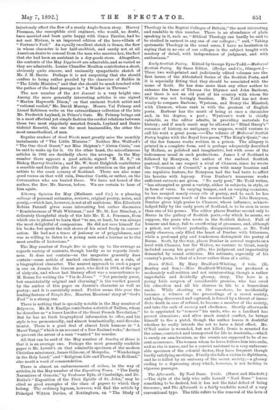Early Scottish Poetry. Edited by George Eyre-Todd.—Mediteval Scottish Poetry. By
Same Editor. (Hodge and Co., Glasgow.)— These two well-printed and judiciously edited volumes are- the first issues of the Abbotsford Series of the Scottish Poets, and it is especially fitting that they should be associated with the name of Scott. He has done more than any other author to enhance the fame of Thomas the Rhymer and John Barbour, and there is not an old poet of his country with whom Sir Walter was not lovingly familiar. Mr. Todd has not done wisely to compare Barbour, Wyntoun, and Henry the Minstrel, with Chaucer, whose rank is with the greatest of English poets. Barbour has the merit of being at once a chronicler and, in his degree, a poet ; Wyntoun's work is chiefly valuable, as the editor admits, in providing materials for history; and if much merit may be allowed to "Blind Harry's" romance of history, no antiquary, we suppose, would venture to call his work a great poem.—The volume of Media-val Scottish Poetry begins with the Royal love-poem, "The King's Quair," one of the few famous works written in a prison. The allegory is printed in a complete form, and is perhaps adequately described by Hallam, as polished and imaginative, but with some of the tediousness usual in such productions. James I. of Scotland is followed by Henryson, the author of the earliest Scottish pastoral, and in one respect a rival of Chaucer, since he wrote the "Testament of Cresseid," a poem with many beauties and one repulsive feature, for Henryson had the bad taste to afflict his heroine with leprosy. From Dunbaes numerous works sufficient extracts are given. "No early poet," Mr. Todd writes, "has attempted so great a variety, either in subjects, in style, or in form of verse. In varying temper, and on varying occasions, he has essayed nearly every r6le of poetry, and to each he has given the supreme touch of the master-hand." Like Henryson, Dunbar gives high praise to Chaucer, whose influence, acknow- ledged fully by the early poets of Scotland, is to be seen in more than one of his poems. The editor places Dunbar second only to Burns in the gallery of Scottish poets,—by which he means, we suppose, the poets who wrote in the Scottish dialect. Full of humour and fancy, full to overflowing of grossness, and, although - a priest, not without profanity, disappointment, as Mr. Todd justly observes, only filled the heart of Dunbar with bitterness, while a profound pity and tenderness distinguish the poetry of Burns. Scott, by-the-way, places Dunbar in several respects on a level with Chaucer, but Sir Walter, we venture to think, rarely included among his great gifts, the judgment and impartiality demanded by sound criticism. His estimate, especially of his country's poets, is that of a lover rather than of a critic.






































 Previous page
Previous page